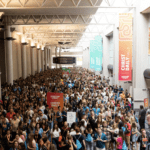![]()
“Have Ye Any That are Sick among You?”
by H. Wallace Goddard
Some time ago we were visiting a ward in a distant city. I do not remember the subject of the lesson in the high priest group that day. But I clearly remember a comment by a brother. He faulted some missionaries who had been in their ward some years previous. Their misdeed had been to go for the “easy baptisms” that now were a hardship to the ward. “Our unit has been burdened by all the handicapped people that a few overzealous missionaries brought into the Church. How can our ward be expected to carry so many burdens? We had to back off those missionaries.”
My spiritual hair stood on end. Something felt terribly wrong. Something whispered within me that the “lame, or blind, or halt, or maimed, or leprous, or . . . withered, or . . . deaf, or . . . afflicted in any manner” are a great treasure in any ward or branch. The idea was so involuntary and so foreign to logic that it had to be true.
The people in our congregations with the biggest challenges may be our greatest blessings. They are a constant reminder to us that Jesus always favored the broken honesty of the humble to the polished assurance of the prominent. He was “a friend of publicans and sinners.”
Chris is hampered by cerebral palsy but every Sunday he inspires ward members with his cheer. For more than 30 years he has been confined to a wheel chair—and he reads with difficulty–yet he blesses the sacrament. His father lifts him to his knees. Chris slowly and deliberately recites the prayer mostly from memory. He enunciates every syllable the best he can. His father prompts him when he falters. Every heart is touched by his valiance.
Chris also leads the music in priesthood meeting. His father wheels him to the front of the gathering. His arm will not move far, his hand will not open fully, and many words are difficult for him to pronounce, yet he leads us. His face radiates the joy that is only known by the pure in heart. I am grateful to Chris for a weekly reminder that joy is the natural fruit of service and goodness.
I remember years ago visiting a rural Utah ward sacrament meeting with a friend. The Sunday I visited happened to be the first Sunday that 12-year-old Tommy passed the sacrament. He had the timidity and awkwardness that is common in 12-year-olds. In addition he was completely blind. He struggled along carrying the sacrament tray and feeling the ends of the rows to get his bearings. He was not smooth or confident. But he was sincere.
In our current ward we have more people with disabilities than any ward to which we have ever belonged. What a blessing! We are regularly blessed by those who are “lame, or blind, or halt, or withered, or afflicted in any manner”
One sweet sister in our ward is completely blind. She lives alone and cares for a horse, 3 dogs, 2 cats and 2 birds. She is a faithful visiting teaching supervisor and stake missionary. She trains other blind people how to adapt. I remember a Sunday when she was sitting at the end of a row near us. When the Aaronic Priesthood bearer offered her the sacrament, she did not respond. She could not see it. Then someone noticed. A sensitive sister nearby came to her aid and drew her hand to the tray. I resolved to be less blind to others’ needs.
Due to the wide array of physical and emotional disabilities in our ward, members regularly reach out to guide, sustain, encourage and love each other. Several give rides to the car-less. Some push wheelchairs. Many offer heartfelt love. What a great tutorial in compassion! This is an environment where Christlike charity can flourish. Each of us in turn leans on that compassion as we make our own halting spiritual progress.
My life is blessed by many “disadvantaged” people I have known over the years. George has very few good teeth, very little education, very little reliable work, and only a hut to shelter him and his family, but he stands ready to help anyone in need.
Clif may not have much, but he provides his roof, his old truck, his tools, and his time to any troubled traveler. Most importantly, he offers encouragement even when he is despairing.
I have studied the people to whom the words “thy sins are forgiven” have been spoken in scripture. In some cases the recipients were sinners who yearned to be better. We are not surprised that they were granted cleansing for their repentance. But other recipients were lame or diseased. It catches us by surprise that Jesus should offer spiritual healing for physical maladies. What qualified them for the sweet blessing of having their sins removed?
The man sick of palsy is a case in point. When he sought healing, Jesus remitted his sins. For the benefit of the disbelieving scribes, Jesus also healed his palsy. But we ask, “What was it about the palsied man that qualified him for a forgiveness of sins?” The answer is central to the gospel message: He had humility.
Disability often ministers to our humility. And humility is the gate to heavenly goodness.
As those with disabilities struggle to do the ordinary, they may experience sustaining grace and come to know–better than most of us–our universal dependence upon God.
And now it came to pass that the burdens which were laid upon Alma and his brethren were made light; yea, the Lord did strengthen them that they could bear up their burdens with ease, and they did submit cheerfully and with patience to all the will of the Lord. (Mosiah 24:15)
Jesus holds up the broken and misshapen as moral models to those of us who glide through life. I would not be surprised if a scientific study found that there is a direct correlation between the number of disabilities in a ward and that ward’s spiritual strength. Any pre-resurrection city of Zion is likely to have more wheelchairs than sports cars.
Perhaps those who limp through life volunteered in an earlier life to take more conspicuous and painful limitations than the rest of us. Perhaps they are the best among us. Perhaps they have special claim on the promise that the last shall be first. They are poignant reminders that we all bear infirmities and none can be healed without divine ministrations.
. . . he hath anointed me to preach the gospel to the poor; he hath sent me to heal the brokenhearted, to preach deliverance to the captives, and recovering of sight to the blind, to set at liberty them that are bruised, Luke 4:18
To be aware of our disabilities can lead us to the Healer. Those who appear unflawed may go unhealed.
I thank God for the sweet souls who have taught me so much. How we should welcome those with disabilities–financial, educational, emotional, physical, or spiritual–to our number! May Heavenly Father send us more of the sick and troubled and make us equal to the lessons they will teach us.
2007 Meridian Magazine. All Rights Reserved.





















